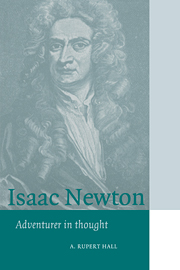Book contents
- Frontmatter
- Contents
- List of Figures
- General Editor's Preface
- Foreword
- Acknowledgement
- 1 The Hopeful Youth, 1642–1664
- 2 “The prime of my age for invention”, 1664–1667
- 3 Widening Horizons, 1667–1669
- 4 The Professor of Mathematics, 1669–1673
- 5 Publication and Polemic, 1672–1678
- 6 Life in Cambridge, 1675–1685
- 7 The Chemical Philosopher, 1669–1695
- 8 The Mathematical Principles of Natural Philosophy, 1679–1687
- 9 Private and Public life, 1685–1696
- 10 Fluxions and Fury, 1677–1712
- 11 Opticks, or a Treatise of Light, 1687–1704
- 12 Life in London, 1696–1718
- 13 A Man of Authority and Learning, 1692–1727
- 14 Later Books, 1706–1726
- 15 Kensington, 1725–1727
- Appendices
- A Newton's Alchemical Studies and his Idea of the Atomic Structure of Matter
- B Newton's Portraits
- C Newton's London Homes
- D Jonathan Swift and Catherine Barton
- E The Fate of Newton's Papers and his Library
- Notes
- Bibliography
- Index
D - Jonathan Swift and Catherine Barton
Published online by Cambridge University Press: 12 January 2010
- Frontmatter
- Contents
- List of Figures
- General Editor's Preface
- Foreword
- Acknowledgement
- 1 The Hopeful Youth, 1642–1664
- 2 “The prime of my age for invention”, 1664–1667
- 3 Widening Horizons, 1667–1669
- 4 The Professor of Mathematics, 1669–1673
- 5 Publication and Polemic, 1672–1678
- 6 Life in Cambridge, 1675–1685
- 7 The Chemical Philosopher, 1669–1695
- 8 The Mathematical Principles of Natural Philosophy, 1679–1687
- 9 Private and Public life, 1685–1696
- 10 Fluxions and Fury, 1677–1712
- 11 Opticks, or a Treatise of Light, 1687–1704
- 12 Life in London, 1696–1718
- 13 A Man of Authority and Learning, 1692–1727
- 14 Later Books, 1706–1726
- 15 Kensington, 1725–1727
- Appendices
- A Newton's Alchemical Studies and his Idea of the Atomic Structure of Matter
- B Newton's Portraits
- C Newton's London Homes
- D Jonathan Swift and Catherine Barton
- E The Fate of Newton's Papers and his Library
- Notes
- Bibliography
- Index
Summary
Swift was in England from November 1707 to May 1709 and from September 1710 to the middle of 1713, on Irish Church business. His first known reference to Catherine Barton is in his terse accounts, where he notes a loss of two shillings at ombre, at ‘Barton's’ on 4 December 1708. Twelve days later he was there again, suffering very bad ‘fitts’ of his habitual giddiness; he was forced to take a chair home, instead of walking as usual, and next day rewarded Mrs Barton's servants with the large present of 7s.6d in gratitude for their attentions. In April, July and August 1709 he recorded letters from Catherine, and on 26 May 1709 one written to her.
During his second and longer visit to England Swift noted in his journal for ‘Stella’ (Esther Johnson) that he dined with Mrs Barton three times in thirty-three months (28.ix.1710; 30.xi.1710; 7.iii.l711); he records visits to her on nine further occasions (19.xii.1710; 23.i.l711; 2.iv.l711; 10.iv.1711; 6.vii.l711; 18.vii.1711; 14.X.1711; 25.x.1711; 20.xii.1711). It is notable that by his own record Swift saw nothing of Mrs Barton during the whole of 1712, nor during the six months of 1713 that he spent in London.
During his first visit to London Swift associated with the Whigs and became friendly with Halifax, among others. He never in any way connected Halifax with Mrs Barton, though he continued to meet both during his second visit to London, when he supported the Tory interest (and therefore disputed with Mrs Barton, who like her uncle was a Whig).
- Type
- Chapter
- Information
- Isaac NewtonAdventurer in Thought, pp. 391 - 394Publisher: Cambridge University PressPrint publication year: 1996



